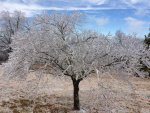Last year my wife landed in Atlanta on the way home during the "Great Georgia Blizzard" of 2014. All flights out were canceled, and she had to find a place to spend the night. The only room she could secure was in a motel about eight miles from the airport. It took he cab more than four hours to get there, and it barely made it--the cabbie, a Paki, had never driven on ice and snow before. The snow and ice on the highway were bad, but the problem was compounded by drivers not used to that kind of weather. It was hell: jackknifed trucks, all lanes blocked or moving at snail's speed and stopping every few seconds, cars in the ditches, vehicles of all sizes unable to negotiate even a moderate grade because they had no chains, studs, or even snow tires. Many vehicles caught in the gigantic jam had run out of gas (those who live in northern climates know better than to let their gas gauge go below the half-mark and fill it up every chance they have) and the people inside were freezing. The police were busy rescuing them. There were power outages everywhere. Students were forced to sleep in their schools. Finally my wife reached her destination. I told her to stay there an extra day because her vehicle was in Montgomery, at the airport, and even Southern Alabama roads were covered with glare ice. I was not worried that she could not drive home--not with a good 4WD truck and after 29 years spent in Alaska, from where we had moved to Alabama in 2013--I was worried about many southern drivers who don't know how to maintain control of their vehicles on ice. I myself had not moved from home--also because my vehicle was encased in a hard shell of ice and I had not been able to open its doors. I could have, by using a hair dryer, as I often had to do in Alaska, but since I had nowhere to go, I just stayed home. In the next couple of days it warmed up, the ice on the roads melted, my wife flew to Montgomery and drove home without problems.
When we were in Montana, in 1981 or 82, we had a tremendous blizzard on Memorial Day. It was heavy wet snow that stuck to utility poles and piled up on power lines. Along Hwy 2 (the one that runs parallel to the Canadian border, about 20 miles south of Alberta) the utility poles went down like domino pieces, one after the other, for miles. It took two months to restore power to all the outlying farmhouses. We, in Gildford, right next to Hwy. 2, and the whole "Highline" (the small towns along that highway) were without power only for a couple of days, though, being close to the main power line.
My wife and I have had enough of snow and cold. That's why we moved to Alabama. As far as I am concerned, "global warming" is nothing but a good thing! Too bad that I am not too sure it's really happening.












